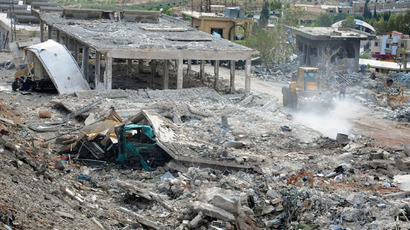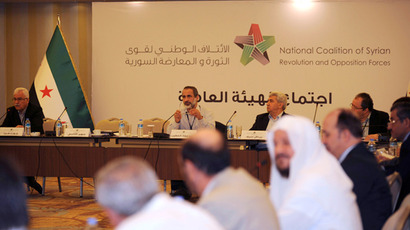Take two: Lavrov, Kerry working to broker redo of Syria peace conference
During their meeting in France, US Secretary of State John Kerry and Russian Foreign Minister Sergey Lavrov are expected to tackle the specifics of the upcoming ‘Geneva conference 2,’ an international push to find a peaceful solution to the Syrian crisis.
So far, neither Russia nor the US has specified an exact date for the conference. After their previous meeting, Lavrov and Kerry announced that the conference could take place by the end of May, but that date was later pushed back to at least mid-June, according to diplomatic sources.
Lavrov, emerging from the talks said that a peace conference on Syria was a “tall order,” but expressed hope that "when the United States and the Russian Federation take this kind of initiative, the chances for success are there."
Kerry spoke for both countries when he said they were committed to upholding the principles outlined in the Geneva Communique of 2012, which proposed a transitional government to be elected by mutual consent between the government of Bashar Assad and the Syrian opposition.
The two officials also agreed that the prospect of chemical weapons use in the country was a daunting one:
"Both of us expressed our mutual concerns about any potential use of chemical weapons and the need to really get the evidence and ascertain what has happened in that regard. Both Russia, and the United States - if it were being used - object to that very, very strongly," the US secretary of state said.
The proposed conference would be a followup to an international meeting in Geneva last year that drafted a peace plan for Syria.
Lavrov and Kerry have met on Monday in France for the sixth time since the beginning of this year, and the Syrian crisis was once again one of the main topics on the agenda. The main challenges are to determine the list of participants, and to ensure that representatives of the Syrian opposition join the talks.
Washington and Moscow have agreed that Russia will negotiate with Damascus, Tehran and Beijing, while the US will discuss the issue with Qatar and Saudi Arabia, RIA Novosti reported.
Lavrov has pointed to a second issue with the talks: ensuring
that key regional players, especially Syria's neighbors, are
present in order to broker an effective and lasting solution to the
crisis - something the two continue to disagree on, especially with
regard to Iran:
“This circle could be expanded to involve all key outside players who have influence on the situation on the ground," said Lavrov, though he didn’t mention the country by name.
Damascus indicated that it is prepared to participate. Syrian Foreign Minister Walid al-Moallem said on Sunday that the government always believed that “dialogue among the Syrian people is the solution to this crisis,” adding that “nobody and no force in the world that can make decisions on behalf of the Syrian people, as they alone have the right to do that.”
Some Syrian opposition organizations expressed willingness to
send representatives to the talks. However, various Syrian rebel
factions gathered for two separate meetings in Istanbul and Madrid
last week and failed to agree to take part in the negotiations
without preconditions.
US not interested in another “unwinnable” Middle East
war
Washington’s willingness to cooperate with Moscow on the Syrian
peace conference indicates Barack Obama doesn’t want the US to be
dragged into another exhausting military conflict abroad, Middle
East expert, Professor Jeremy Salt, told RT.
“And I think when we look at this diplomatic situation, it’s
very clear that Barack Obama doesn’t want to get dragged into this
any deeper. Now, all the signs are very very clear,” he said.
“Kerry and Lavrov talking and very clearly developing a good
working relationship. The Turkish prime minister, Recep Tayyip
Erdogan, going to Washington last week and went there with evidence
of chemical weapons being used [by Syrian governmental troops] and
so on, so forth. Barack Obama dodged all of this. He’s very very
plain that he wants this thing to be settled and doesn’t want his
presidency to end with the US being caught up another unwinnable
war in the Middle East.”
Meanwhile, the EU remains split over on the issue of arming the
Syrian rebels as the Monday’s talks between the Union’s foreign
ministers brought no result.
The push to ease the embargo by Britain and France has faced strong
opposition from a five-nation bloc led by Austria. The country’s
Foreign Minister Michael Spindelegger said that Europe’s top
officials failed to agree on a strategy, while EU sanctions against
the Syrian government are set to expire on June 1. Austria
continues to be a staunch opponent of the strategy of sending
weapons to Syria, arguing that the move would only exacerbate the
crisis and taint the EU’s role as peace broker.
Spindelegger’s main concern was that come June 1, "everybody is
entitled to deliver weapons to the Assad regime or to the
opposition.''
During the negotiations, the UK’s Secretary of State for Foreign and Commonwealth Affairs, William Hague, said that unless the weapons embargo was lifted extremism would flourish in Syria.

The situation, in which the world denies the Syrian population the means to defend themselves “is creating extremism, it is radicalizing people,” he explained.
Hague also said that he sees amending the embargo as a way to support the diplomatic solution to the conflict as it sends the Assad regime “a clear signal that it has to negotiate seriously” in Geneva.
And if the EU won’t be able to work out a unified sanctions policy, "each country will have to ensure it has its own sanctions," he added.
Salt has labeled the UK officials’ statement as “bizarre”, saying that it’s clear that more weapons would only lead to more deaths in Syria.
“I find this very odd because we know that extremism in Syria has flourished simply because arms have been pumped into the country,” he stressed.
“Now, Hague must know, surely knows, that there’s no way that the armed groups can recover from where they are now. They can’t overthrow the government. There’s no way they can do that. So, why is he saying this? The only reason he can be saying this that he wants to have a card in his hand when this conference begins next month in Geneva. In other words, that Bashar [Assad] can be told that unless you agree to do what we want we’re going to continue arming the rebels.” The expert pointed out that there’s no unity not only within the EU, but also within the ranks of the Syrian rebels as it’s still unclear, who’ll represent the opposition at the Geneva Conference.

“At the moment, the anti-Syrian coalition doesn’t even have a Syrian negotiating partner. Because the Syrian National Coalition (SNC) said we’ll come, but only if Bashar Assad steps down. But there’s no way he’s going to step down,” he said.
“So, at the moment they don’t really have a partner, a Syrian partner in Geneva. And even if they do if the Syrian National Coalition does go there, the SNC doesn’t have support from the armed groups on the ground, in fact, they’re opposed to it. So, their negotiating position is complete mess.” With the forces loyal to President Assad being on the brink of winning the battle for the strategic town of Qusair, Salt believes that it’s not at the negotiation table, but on the battlefield where the fate of the Syrian conflict will really be decided.
“The center of the action and the center of our focus right now should be on what’s happening on the ground. And if we look at what’s happening there in Syria, we know that the Syrian army is just about retaking completely the town of Qusair, and very shortly they’ll move north towards Homs to make sure that’s completely clean,” he said.














